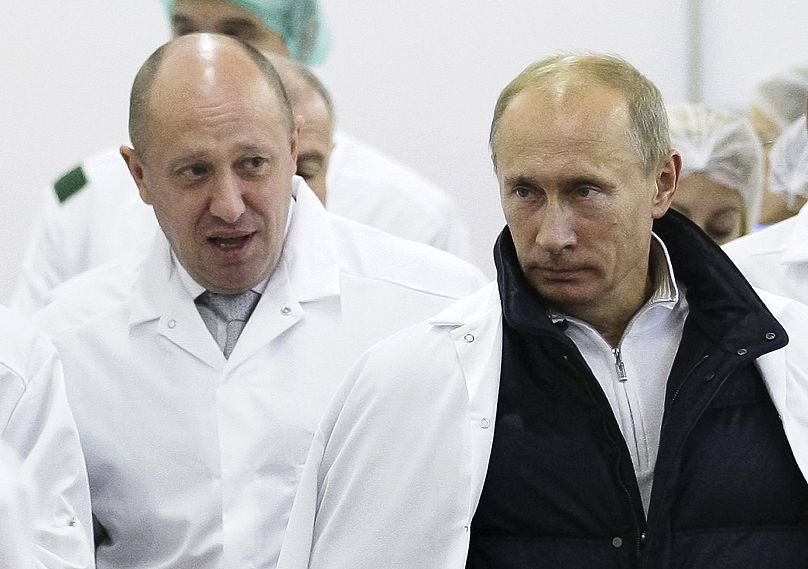Euronews speaks to analyst Samuel Ramani to hear about the people and history behind the Kremlin's shadow army, the Wagner group.
"This is a group of criminal mercenaries, that is what it is objectively called, which is the life insurance of failed or coup regimes, whose role and purpose is to protect faltering and coup regimes."
 ADVERTISEMENT
ADVERTISEMENT
 ADVERTISEMENT
ADVERTISEMENT
This is how French President Emmanuel Macron responded when asked about the Wagner group at a press conference in February.
"Mr Prigozhin, who is leading [the Wagner Group] is, in my opinion, a war criminal," added Merrick Garland, United States Attorney General during a Senate Judiciary Committee on 1 March. "And maybe it's inappropriate for me to say that as a judge before I have all the evidence, but I think at this point we have more than enough evidence for me to take that view."
But what is the Wagner group, who is behind it and what is its relationship with the Kremlin? Euronews asked Samuel Ramani, an Associate Fellow of the Royal United Services Institute in the UK.
More than 80% of its members are convicts
Founded in Russia in 2013, the Wagner Group is supposedly a private military company.
"But in reality, it is a de facto extension of Russian security organs and apparatuses, in particular the main intelligence directorate," Ramani told Euronews.
More than 80% of its members are convicts, recruited in prisons, and the rest are mercenaries. UN experts denounce the use of pressure tactics by Wagner's recruiters.
"The training centre is very close to the base of the GRU (the Russian military intelligence service)," Ramani points out. "So that's very interesting because it shows the links perhaps between Russia's intelligence services and the Wagner Group."
Wagner Group around the world
Wagner soldiers are deployed in several regions and countries where Russia's interests are at stake.
"Starting in Donbas, then in Syria and Libya [...] and then in many conflict zones in sub-Saharan Africa, such as Mozambique, Mali and the African Republic," Ramani explained.
The group was first active in Crimea in 2014 during Russia's annexation of the peninsula. Now, the US estimates that Wagner has about 50,000 troops fighting in Ukraine.
"But heavy casualties in Bahkmut, as well as the paucity of prisoner recruitment and the uncertain success of its other recruitment efforts have probably diminished the number," Ramani said.
After years of denial, Yevgeny Prigozhin has admitted to being behind the group and video footage suggests he is actively participating in the fighting in Ukraine.
Yevgeny Prigozhin: From prison to the Kremlin
Prigozhin is a St. Petersburg oligarch with an unusual success story.
In the 1980s, he was locked up in a Soviet prison after being arrested for armed robbery. By the following decade, Prigozhin was in charge of the Kremlin's catering service, thanks to another improbable plot twist.
Upon his release from prison, he began working with his stepfather as a hot dog seller, a business he turned into a catering service and then a St Petersburg restaurant called New Island. Over time, the restaurant became a popular hangout for the city's elites, including Vladimir Putin, then the right-hand man of the city's mayor.
Today, the man known as "Putin's chef" owns companies in the audiovisual, mining, consulting and military sectors.
According to Ramani, Prigozhin's power is "inextricably linked to his long relationship with Vladimir Putin. Prigozhin controls mining assets in Africa that are quite lucrative -- gold and diamonds -- but he does not control the kind of formally-recognised state-owned enterprises that most other oligarchs have."
Enemies in high military circles
But as the fighting in Ukraine rages on, things appear to be running far less smoothly for Prigozhin. He has rivals among Russia's top military brass, including Valery Gerasimov, Chief of the General Staff of the Russian Armed Forces and architect of the war in Ukraine.
"Prigozhin likes to claim that he very effectively runs an army within an army. He has jets, he has missile defences, he has ammunition and various types of artillery," said Samuel Ramani. "But, in fact, it is increasingly dependent on outside supply."
"So I don't think Prigozhin has much of a role in terms of front-line strategy in decision-making outside the Donetsk context," he added.
Then there is the question of funding. The Pentagon estimates that Prigozhin spends about €90 million a month on maintaining the mercenary force.
An open secret in Russia
Until last year, much of Russian society had heard very little about the Wagner Group. Ramani explains that this is partly due to censorship in the country's media. But the situation is changing.
"I think among the staunch supporters of the war, their view is that a patriotic organisation and revolutions or any crusade against the oligarchs is viewed quite favourably because the oligarchs are very unpopular among the vast majority of the population," Ramani told Euronews.
Wagner soldiers have been accused of war crimes, including torture and rape, in the areas where they have been deployed.
"But those who choose to live in Russia and remain in the country permanently will probably have a very difficult time being prosecuted in person because Russia is not a party to the International Criminal Court, and has a policy of not extraditing its citizens to these international bodies or to Ukrainian or Western courts," Ramani said.
And although Putin does not officially endorse the Wagner Group, the State Duma - Russia's lower house of parliament - recently passed a bill that would punish anyone caught "discrediting" volunteer groups fighting in Ukraine with up to 15 years in prison.











